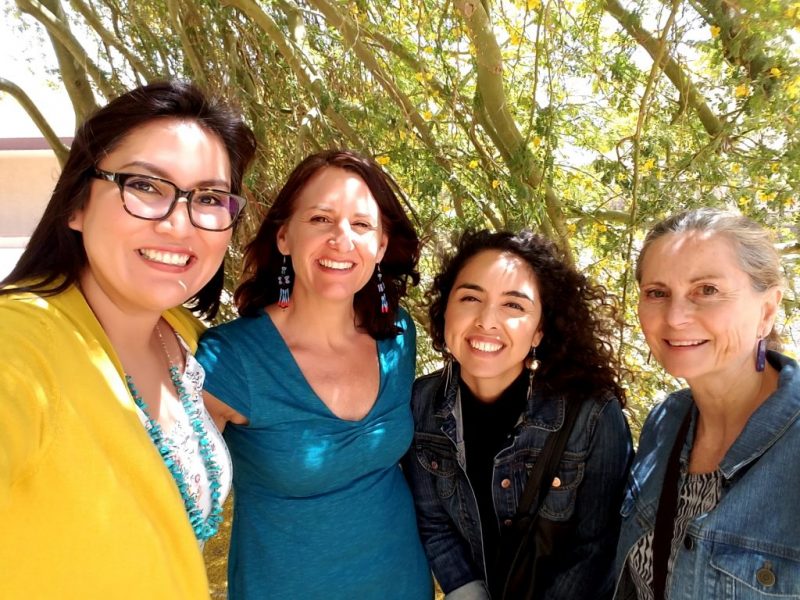How is SHERC’s work done? Through 5 dynamic cores
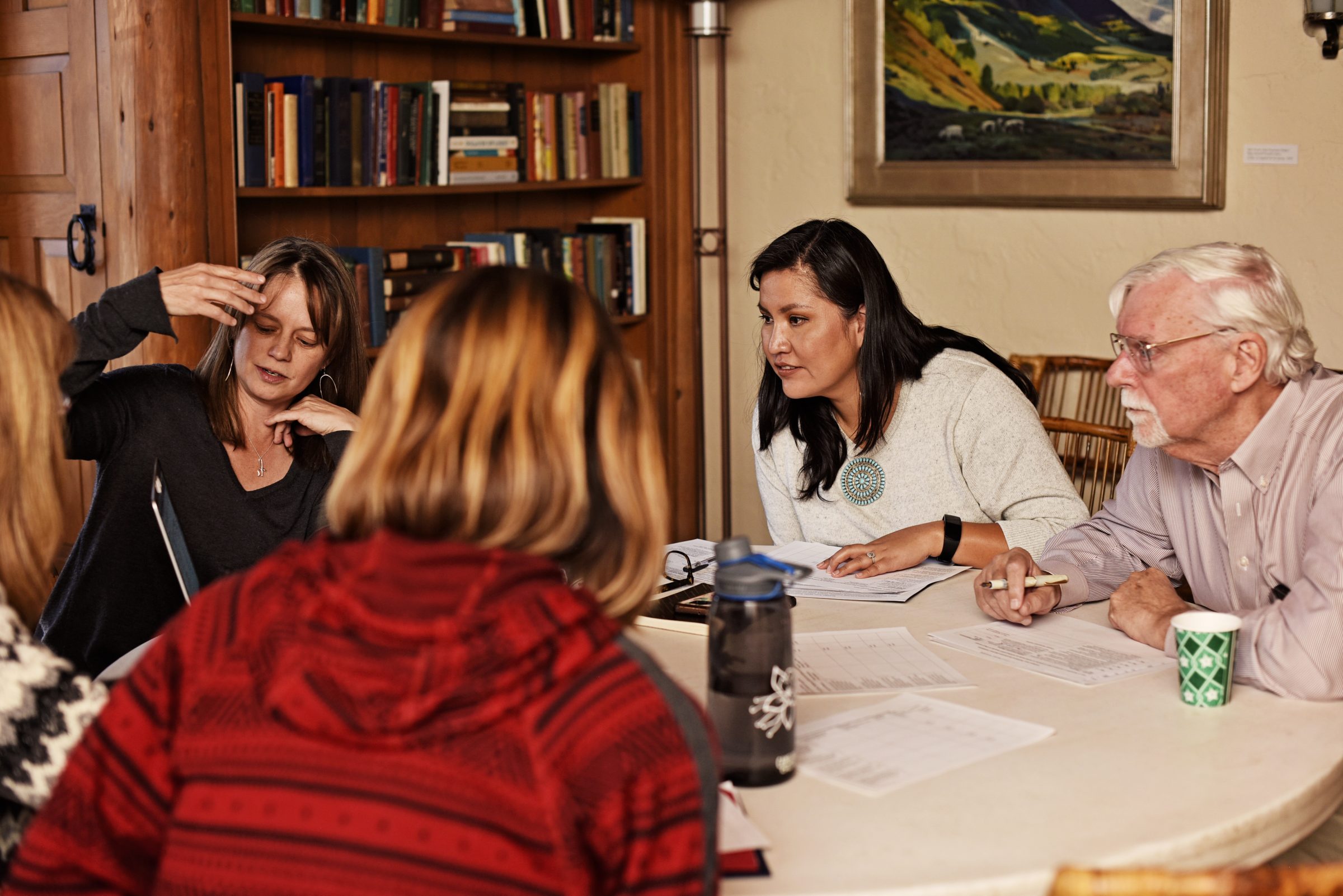
Through an innovative and dedicated team of faculty, staff, students and community organizations, the Southwest Health Equity Research Collaborative (SHERC) addresses health disparities among diverse populations in the southwestern U.S. through health equity research.
SHERC’s strength lies in its five organized cores—Community Engagement Core, Research Capacity Core, Investigator Development Core, Recruitment Core and Administrative Core—each with its specialty, but all working in synergy to increase basic biomedical, clinical, and behavioral research at Northern Arizona University.
In the next five years, the cores will have a new common goal of incorporating a focus on diversity, equity, inclusion, and justice (DEIJ) in alignment with NAU’s new charter, “NAU 2025—Elevating Excellence.”
SHERC’s leadership, Community Expert Board (CEB), staff, and others will work collaboratively with DEIJ experts to guide the development, implementation, and assessment of the center’s work.
As one of the only Research Centers in Minority Institutions (RCMIs) dedicated to serving people and training investigators who are American Indian/Alaska Native, SHERC’s five cores will also continue to work together with community partners to expand their ability to address health disparities in chronic and infectious diseases and determine high-priority behavioral health conditions.
Community Engagement Core
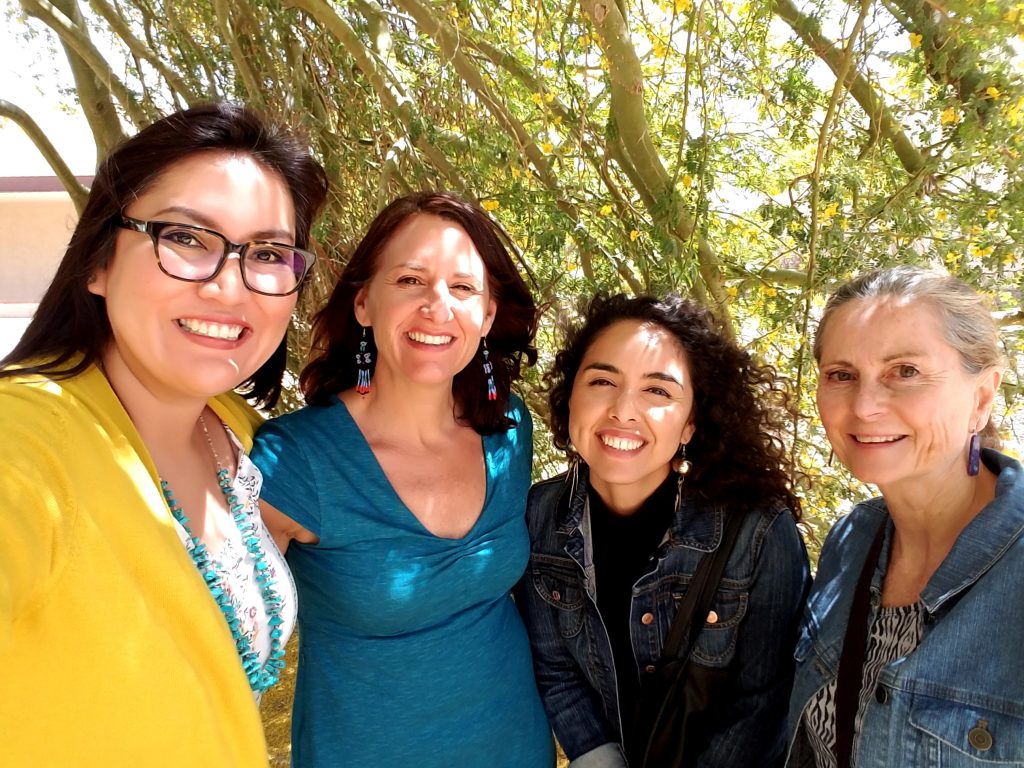
The overall goal of the Community Engagement Core (CEC) is to cultivate and expand relationships with multisectoral, community-based organizations and leaders to address locally identified health concerns.
Led by Samantha Sabo, associate professor, Department of Health Sciences and CHER, with co-lead Nicolette Teufel-Shone, professor, Department of Health Sciences and associate director of CHER, the team includes Heather Williamson, associate professor, Department of Occupational Therapy and CHER; senior program coordinators Carmenlita Chief, Alexandra Samarron Longorio, Mark Remiker and Nicolas Beckett.
The CEC will use an innovative, four-direction framework to address the social determinants of health—the conditions in which people are born, live, learn, work, play and age—in Arizona and to develop a dynamic, comprehensive plan for the CEC.
Partnerships will work at the community, provider, and policy levels for health equity research, intervention, translation, and dissemination.
“Over the last decade, public health researchers and practitioners have shifted their focus from identifying health disparities to addressing the economic, social, and environmental ‘root causes’ of health inequity,” Sabo said. “The CEC team recognizes that multisectoral partnerships—beyond the realms of health and health care are critical in building the necessary infrastructure, policy, and political will to ameliorate health inequity – and this is what we intend to do—in partnership with community, faculty, staff and students across NAU and the region.”
During the past five years, the CEC successfully developed a Fairness First Campaign creating 10 health equity podcasts and engaging community members and researchers through two programs: Health Justice Futures and Fairness Firstx Talks. They also developed a series of Fairness First blogs where NAU early-stage investigators had an opportunity to connect their work with health equity.
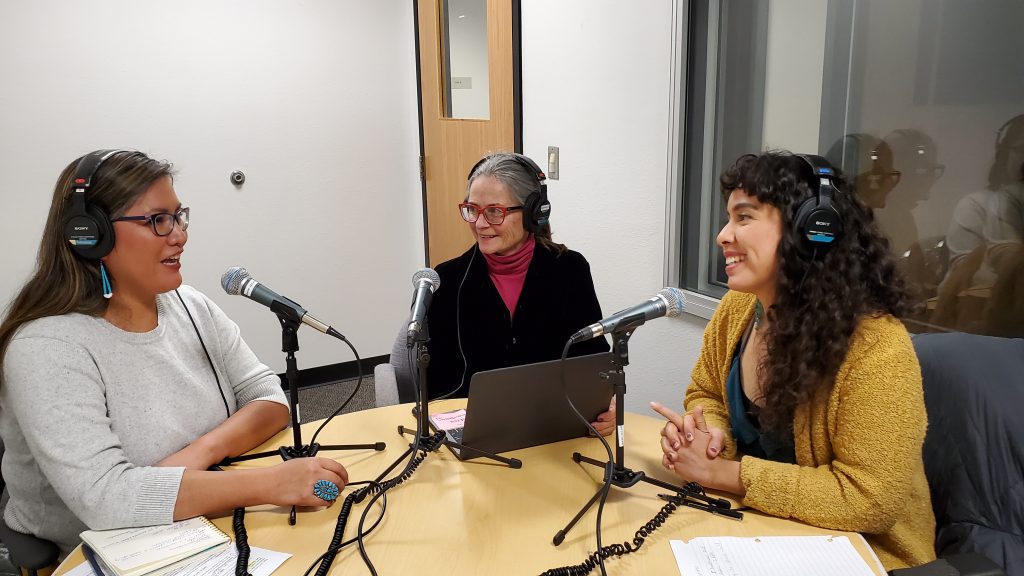
The CEC team created the 2020 Regional Health Equity Survey Report (RHES), developed from a survey of 200 Arizona county-level leaders from various sectors who shared their knowledge, attitudes and actions on health equity with researchers from the CEC. Leaders answered in-depth survey questions in the RHES that addressed the social, environmental, and economic conditions that impact the health and well-being of the communities they serve.
To assist NAU faculty in developing relationships with community partners, the CEC created the Community-Campus Partnership Support (CCPS) program to offer funds for partnership building. In the first five years, the CEC funded 17 CCPS partnership awards. Additionally, 81 percent of NAU leads on the 16 CCPS projects supported by CEC are early-stage investigators.
For the upcoming five years, the CCPS has changed its name to the Health Equity Research Support (HERS) and has been expanded and launched as a two-track program—Partnership Development and Community Dissemination. Both tracks provide $5,000 of support and mentored training through a cohort format, which includes three face-to-face workshops over a one-year period.
The Partnership Development track workshops introduce strategies and best practices to build an equitable alliance between community practitioners and university investigators. Funds can be used to meet face-to-face to discuss potential collaborative work or to attend a conference addressing common interests to inspire potential projects.
The Community Dissemination track workshops provide training to university scholars on innovative and effective ways to share results with community members and stakeholders with a focus on policy and systems change. Applications to participate in each of the programs will be available in November, 2022, and kick off in February, 2023. For more information, visit the HERS page.
Research Capacity Core
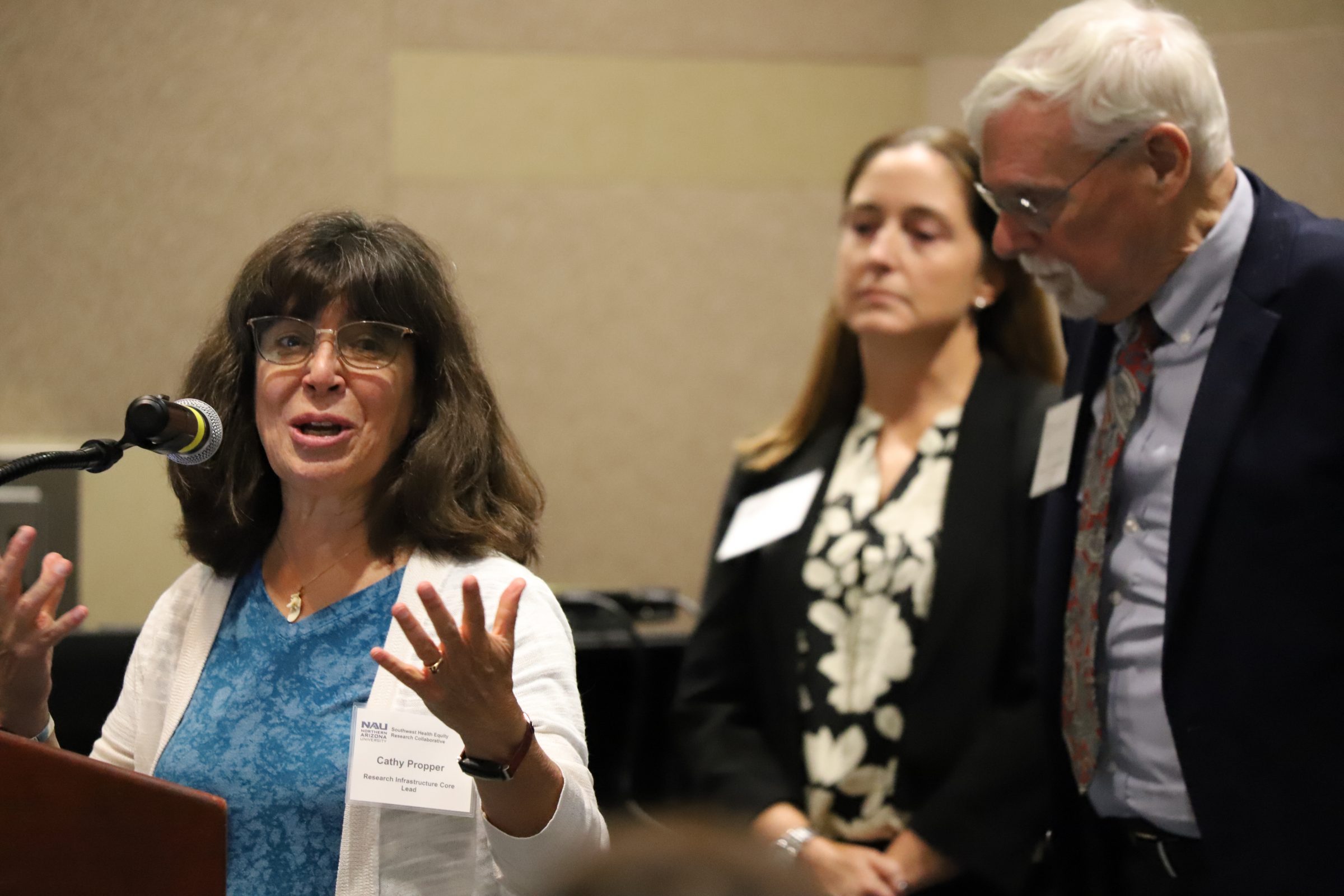
The Research Capacity Core’s (RCC) primary function is to ensure the success of all SHERC research projects and faculty by providing access to computing, statistical, and research design expertise.
RCC also works across campus and with the National Institutes of Health’s Research Centers in Minority Institutions and Clinical and Translational Science Institute partners to maximize the potential for multidisciplinary collaborations that address ongoing and emerging health disparities in the southwestern United States.
“The RCC’s goal is to grow the health equity-related research program at NAU. We will work closely with the other cores to bring these enhancements to support health equity across the Southwest,” said Catherine Propper, RCC lead and professor, Department of Biological Sciences. “Through our specific aims we will provide resources to ensure the success of investigators at all phases of their research experience.”
Other RCC team members include co-lead Regents’ Professor Emeritus Robert T. Trotter II; co-lead Monica Lininger, associate professor, Department of Physical Therapy and Athletic Training; Mark Remiker, senior research coordinators; Indrakshi Roy, biostatistician, and Amy Gelatt, research coordinator.
RCC resources include financial support to use the Center for Health Equity Research’s Technical Assistance Group (TAG) to provide help on study design and analytic procedures, workshops to support researchers’ educational needs and support to purchase research equipment.
“The RCC is excited to support and implement new pathways for all investigators conducting research important to achieve an equitable human experience,” Propper said.
RCC resources include:
• Access and enhancement of computing and laboratory facilities that focus on multidisciplinary research programs to address health disparities. • A rapidly developing health informatics infrastructure.
Increasing NAU’s research capacity through technology
In many ways, NAU’s most critical core facility for increasing research capacity is the computational core.
SHERC’s funding of NAU’s computer infrastructure during the first five years of the program resulted in a dramatic increase in the use of computational facilities that support research, including shared secure servers such as ADAMS—a high-security compliant server purchased during the first SHERC funding cycle—and MONSOON—shared high-performance computing system.
SHERC renewal funding will support the purchase of a new dedicated secure server and upgrades to MONSOON. In addition, SHERC will provide $500,000 to support modernization at the main ITS facility on campus to increase the capacity of NAU’s existing systems’ efficiency and effectiveness for cooling and power distribution.
With support from NAU Facilities Services and the consultation of industry providers of data-center power and cooling design, NAU ITS will improve fixed assets in the computer center by:
- Updating and expanding the central uninterruptable power source and electrical power distribution capabilities.
- Installing a hot aisle containment system to optimize cooling in the NAU data center.
Investigator Development Core
SHERC’s Investigator Development Core (IDC) focuses on supporting the development of NAU’s next generation of leaders by providing mentorship, grant funding and career development guidance and resources.
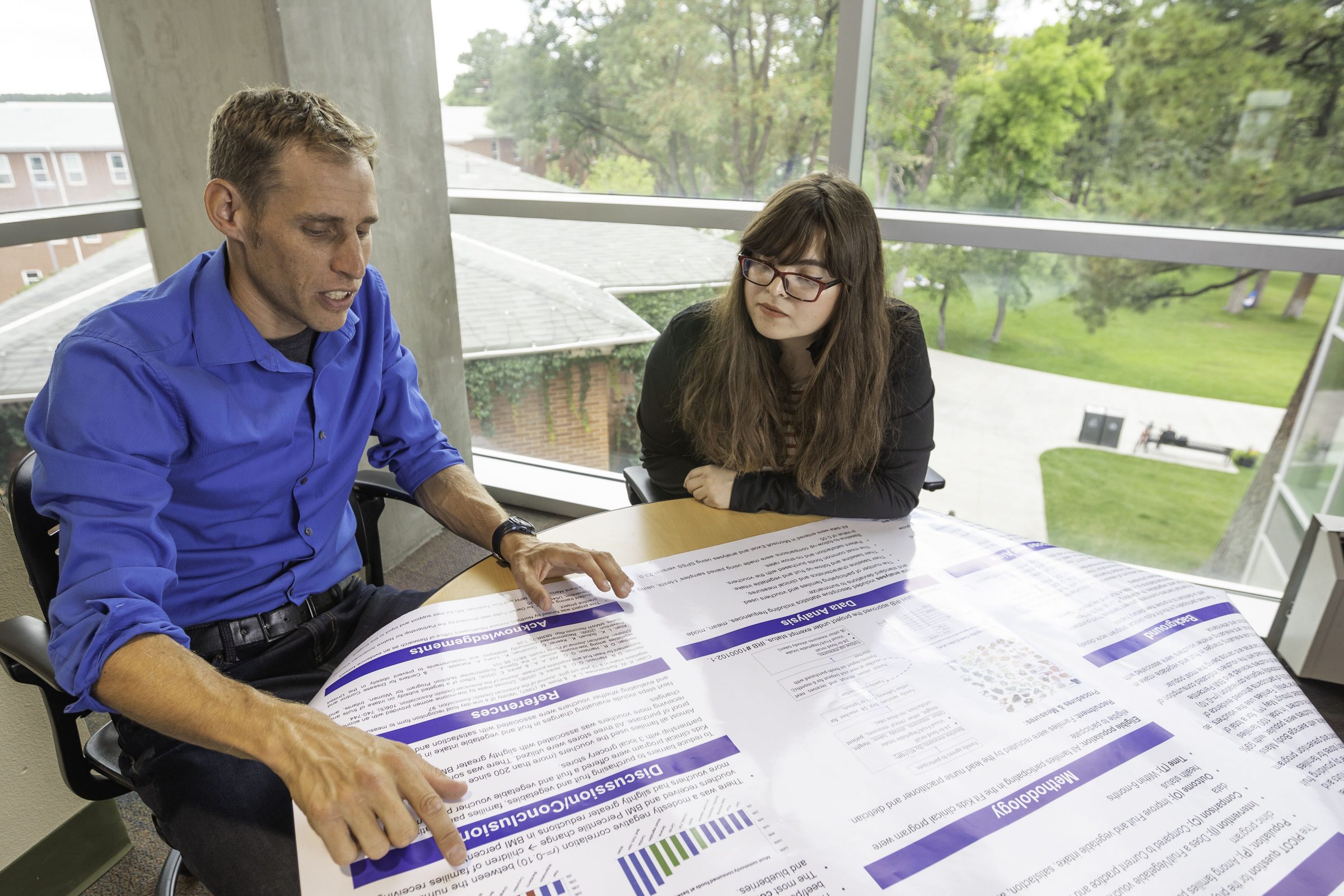
“The IDC aims to build on the amazing success of SHERC investigators during the initial five years, which saw several major and unique accomplishments by NAU early career faculty and postdoctoral fellows,” said Dirk de Heer, IDC core lead. “Over the next five years, the IDC aims to continue what worked well in the past years, and provide one-on-one mentorship, continue a Pilot Project Program and offer career development workshops and grant writing,” de Heer said. “In addition, we look forward to expanding our offerings to include a renewed focused on ‘team’ and translational science and offer a newly developed mentorship program.”
Also in the IDC core are co-leads Teufel-Shone and Heidi Wayment, interim dean of SBS, Taylor Lane, research scientist, and Christine Smith project manager.
One of IDC’s successful initiatives that will continue in the next five years is the Pilot Project Program (PPP). Successes from that initial funding period include two researchers who have secured significant new funding from NIH after completing PPP projects: Ricky Camplain, assistant professor at CHER and the Department of Health Sciences, and Amanda Hunter, CHER postdoctoral scholar. Both successfully secured the first-ever major National Institutes of Health career development awards (K01 and K99/R00, respectively) in NAU’s history to support their research and career development for the next five years.
Three recipients of PPP funding, Emily Cope, Camplain and Joseph Mihajlevic, all now have major new research projects in the center.
“All three received an independent NIH research or career development award, a truly unique accomplishment that exemplifies the strength and breadth of expertise amongst our NAU faculty,” de Heer said.
Since receiving SHERC PPP funding, 76 PPP leads either became principal investigators on an external health-related award or are principal investigators on a pending health-related proposal.
The IDC will again have a call for PPP proposals, which will support up to three NAU faculty per year with two-year grants.
The PPP announcement is expected to come out shortly and aims to support innovative research projects among faculty at the assistant professor level and postdoctoral fellows at NAU.
Administrative Core

The purpose of the Administrative (Admin) Core is to ensure that research and career enhancement in health equity continue to grow at NAU. The specific goal of the Admin Core is to create a framework where the individual cores work together efficiently and effectively. The Admin Core achieves this goal by continually and carefully monitoring SHERC component activities.
The primary functions of the Admin Core will be:
- Prioritize activities in all cores.
- Set and maintain a collective understanding of SHERC’s aims and objectives.
- Meet or exceed project milestones.
- Document progress against benchmarks.
- Coordinate and keep all cross-core activities and functions “on time and budget.”
Continuously improve individual core and cross-core products and outputs through feedback and recommendations for improvement.
The Admin Core promotes a shared vision, goals, and outcomes; allocates and oversees all SHERC resources; establishes and maintains community and institutional partnerships; integrates the expertise of the Advisory Committee and cores; schedules meetings and other activities essential to the success of SHERC; identifies and supports key personnel and the health equity research conducted at SHERC; evaluates SHERC’s progress in research and institutional capacity building, and oversees all other SHERC activities.
The Admin Core includes Regents’ Professor Julie Baldwin, principal investigator of SHERC and director of the Center for Health Equity Research; Suzie Martinez, program manager; Bree Bullard, administrative associate; Kelly Laurila, lead evaluator; Michael Petillo, senior evaluation coordinator; Taylor Lane, research scientists; Denise Stippick, grant and project support coordinator, intermediate; and Lisa Dahm, marketing and communications coordinator, intermediate.
Recruitment Core
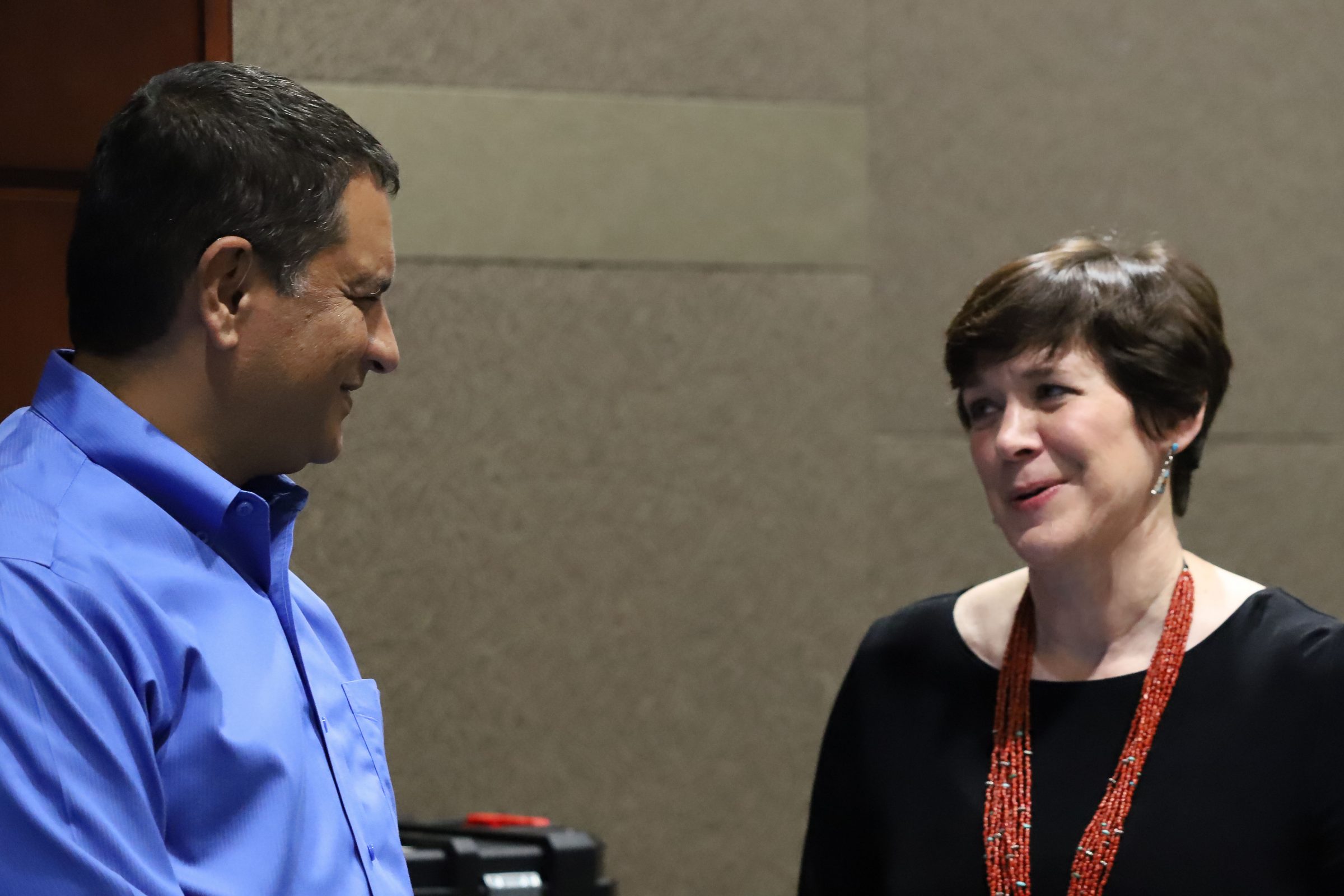
NAU has made a difference already in hiring new faculty and research associates to complement the SHERC award. Through the Recruitment Core, NAU pledged to hire two new tenure-track faculty. SHERC will support all aspects of the recruitment and hiring process and start-up packages for the new faculty.
The Recruitment Core will support the new hires in establishing collaborative and independent health equity research programs at NAU and integrate them into SHERC as collaborators, mentors and leaders.
New faculty members will have the opportunity to work closely with the CEC to develop relationships with community partners and will have the assistance of the Office of the Vice President for Research in establishing contacts with regional public health partners. New SHERC faculty will have appointments in CHER, and will also have an academic home department depending on their areas of expertise.
This research is supported by a NIMHD center grant to the Southwest Health Equity Research Collaborative at Northern Arizona University (U54MD012388).
